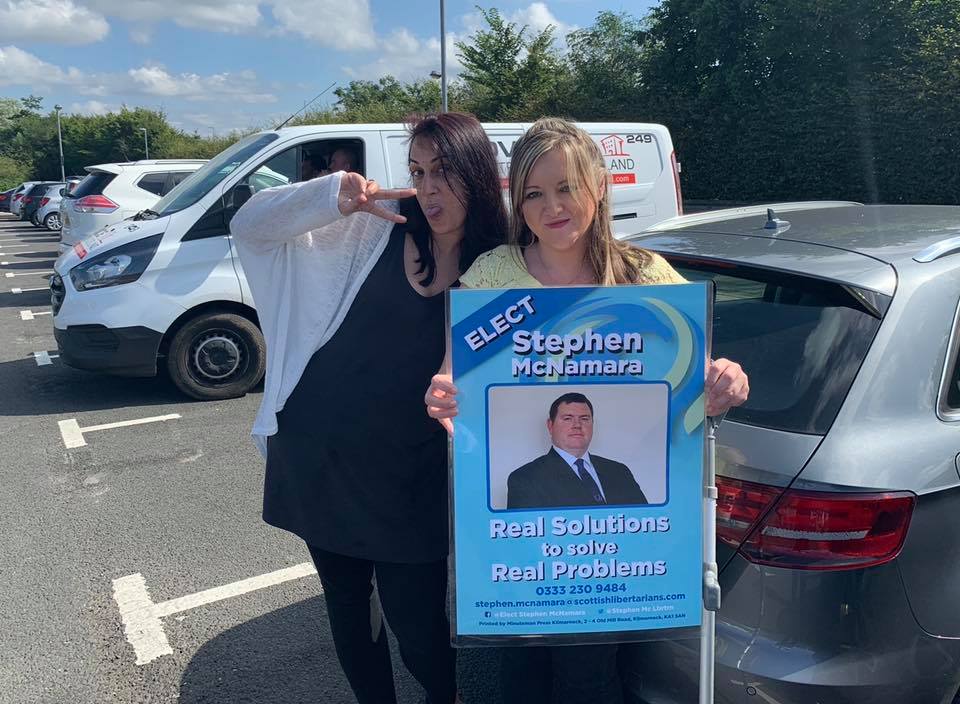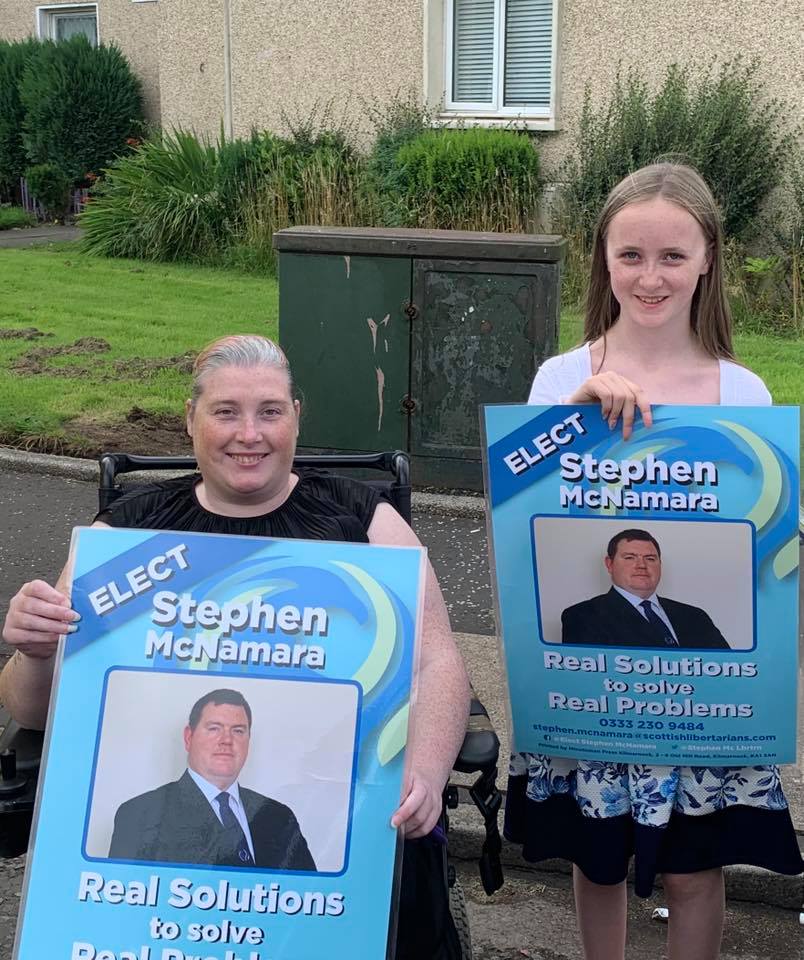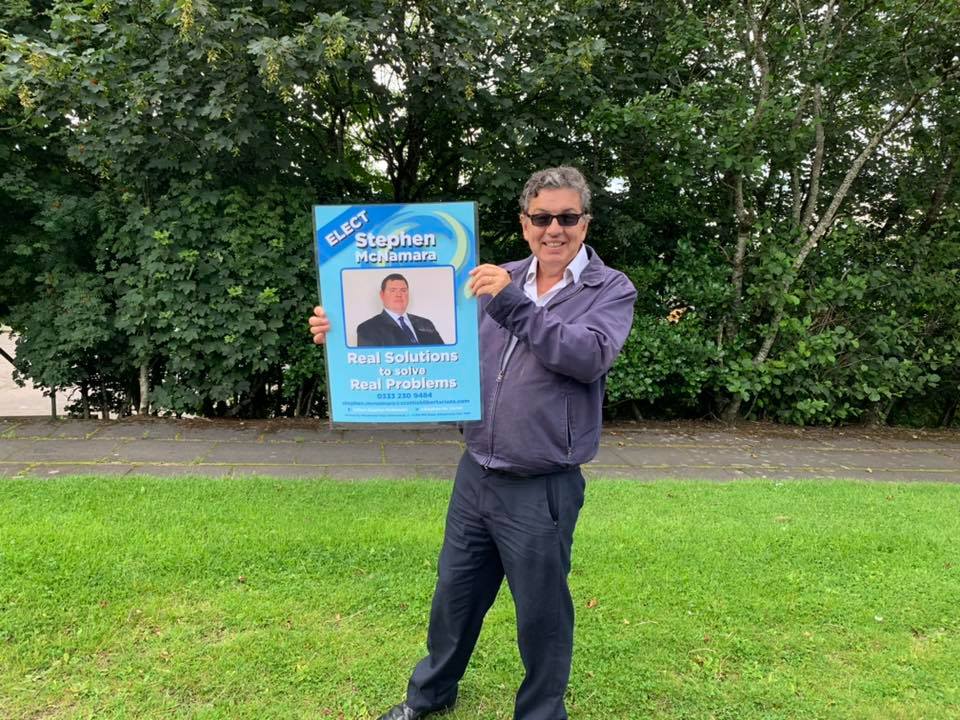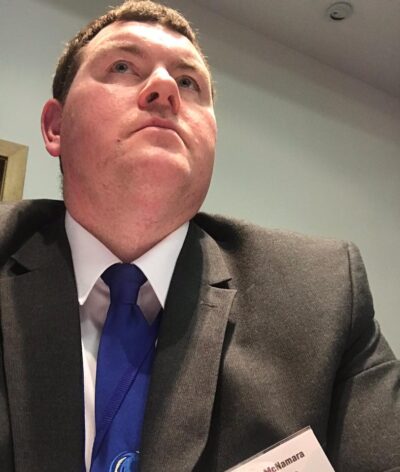Stephen McNamara is a Scottish political activist, who has run for office as an independent and for the Scottish Libertarians. He has been involved in a new party called Choice, employed as the Director of Member Services to assist in the initial set up, and to ensure their administrative systems serve their local leaders and members in the way intended.
We interviewed Stephen about his political views, experience, and the new party.
Stephen thanks for your time.
“They had passed laws that gave absolute power to unaccountable statists who could do anything they wanted. They were ultimately responsible for what happened. They were my enemy.”
How did you first get involved in politics, and how would you describe your political leanings?
It’s hard to put a finger on a specific moment in time for when I initially got involved in politics. I think it’s been a combination of individual situations over the years that have dragged me into politics through necessity rather than choice.
Having had that literal knock on the door from government employees back in 2007 and the “we’re here to help you” speech from them, my family went from being relatively comfortable, even if far from perfect, to living an absolute nightmare, some things of which I still suffer PTSD from. With their generous offer of help I ultimately ended up without a family or home with nothing but the clothes on my back, suicidal from the stress, begging for death to take me.
On my way to jump from a bridge into a river, I was found by an independent charity. As I was walking past their little red bus one woman came out and asked if I was hungry. Scared and paranoid of what her intentions were, I reluctantly agreed to accept a sandwich and a hot chocolate drink in a brief interaction that ultimately saved my life. Weeks and months passed where their weekly hot chocolate and non-invasive independent support helped me gain a new outlook.
I became active in the Yes campaign for Scottish independence, in a misguided assumption that independence would make things better. Oh how wrong was I. I discovered that the SNP government I was wholeheartedly supporting to obtain independence was the very same government that had passed the laws that had put me where I was. They had passed laws that gave absolute power to unaccountable statists who could do anything they wanted. They were ultimately responsible for what happened. They were my enemy.
That’s when I started to look at what choices I could make to get my revenge and make sure that my children and many other families would not suffer in the same way I did.
Those politicians feed on votes so I knew I had to start taking votes away from those in power to stop them from continuing to destroy our lives. That’s why I got involved and started to take a stand in elections against them.

“Even if not in person, a physical letter or even a leaflet makes the difference between seeing some random post on social media versus seeing a physical item in your mailbox.”
Having run for office and being very active on social media, what do you think works / hasn’t worked in getting your political messages across?
Getting a message across to voters is really difficult. Social media, I’ve found, is one of the worst ways to get known outside of your own connections, but getting onto ballot papers and meeting people, physically, out there in the real world, counts for everything.
There is a strong psychological connection human beings have with each other when face to face in the real world. It’s a game changer when you can get out there. Even if not in person, a physical letter or even a leaflet makes the difference between seeing some random post on social media versus seeing a physical item in your mailbox.
If potential voters or party members have that human or physical interaction with you then it is far more effective than anything you can do online.

How would you judge the current political situation in Scotland?
The current political situation in Scotland is full of delusions and wishful thinking, from ALL colours of rosettes.
We have a yellow mouldy watermelon coalition government who have apparently forgotten who voted for them and why, with a Red / Blue opposition in name only and who have apparently forgotten how to vote against their counterparts in Holyrood. The country, it seems, is in a type of perpetual stalemate in an ever downward socialist spiral. It looks like only rock bottom could stop this trend… Or is it?
There are two parties currently in Scotland’s political periphery, one being the Family Party and the other Alba. Alba is the stronger party every which way you look. They have financial support, a strong and active membership, and very experienced candidates all coming out and singing from the same hymn sheet. Their downfall? They won’t step up and stand against the incumbents in constituency seats. There is an old saying about sometimes taking a step back in order to go forward, and that’s where Alba need to grow a pair and stand in the constituencies. By taking votes away from the incumbent government MSPs, they risk a Tory run government in Scotland. To your libertarian readers, we know that replacing one socialist party with another won’t make a difference, but in the collective psychology of Scottish voters, the political landscape monopoly will have been broken and people will start to take a genuine interest in what our politicians really are doing when the press are distracting us with the latest headline attention grabber… Alba first needs to take down the SNP before it can run for government.
The Family party on the other hand, appear well organised and financially stable too. Their online content is of decent quality and they reach out through physical campaigns on issues very much in the minds of middle class voters, tugging at the heart strings of every concerned parent too. Their policies easily translate between left and right leaning voters to disrupt election counts on both sides.
I would predict that they could easily become a mainstream party in the 2026 Holyrood elections simply by standing a candidate in every constituency and region. The Local elections last year clearly demonstrated that they have the candidate numbers to do so, but will they have the strategical willpower to make it happen? Time will tell.
You are involved in a new political party Choice. What are the core beliefs and main policies of the party?
Back in 2016, myself and my wife Stef, met a handful of libertarians in a pub in Aberdeen. We struck a good friendship with some and helped this micro party become the 6th largest party in Scotland at one point and recruited members and candidates through our campaigning and fundraising efforts. Sadly my time with them ended very abruptly leaving me politically homeless. Their decision to ban me from the party, despite the delusions of those running it, immediately saw the party go from their best ever election performance in 2021, to their worst in 2022! I did warn them, repeatedly, not to go down the path they chose, but choose that path they did. Not only did they post their worst ever election result in the party’s history, but they lost their three largest financial donors and a significant chunk of members and activists in the following weeks.
When asked about what I would do differently in running a party, my response was published in Free Speech, a newsletter published by Blacklist Press. In it I wrote a fairly detailed outline of how a party could operate in a positively libertarian way and have the entire power structure decentralised.
This article was picked up on by a small group of libertarian activists who bent over backwards trying to convince me to help them start up such a party. Eventually I agreed, reluctantly at first, but as the group mobilised and started tossing cash into the ring to fund it, we got to work building the vision I had quietly shared one Monday afternoon.
Choice Party UK was born.
Today the registration details are now in the hands of the EC where we await their registration decision.
Gordon Stirling, Keyrin Von-Döring, and Christopher Wilkinson are at the helm of this beautiful ship about to set sail headfirst into the storm that is politics! I’ll be working diligently behind the scenes serving this crew as they recruit and train members, activists, future candidates and the local leaders. In just a matter of weeks this new party will be fighting for individual rights and devolved powers.

“the biggest difference Choice candidates have over other party candidates is that, if elected, they have an automatic free vote as standard! No three-line whips!”
How will Choice differ from other political parties of a similar vein?
Choice differs from other parties in that where they elect a single leader to be the face and brains of a party, Choice has a completely devolved leadership structure. Gordon Stirling, the registered party leader, occupies a legally required position but which is ornamental in every other way. Gordon is also the Leader of the East Ayrshire area of the party, where his position holds some decision-making powers within his local area only. The local leaders can overrule decisions taken by other leaders in other areas so that the members of those areas have full control of what they want for their area and who they want to represent their views within that area.
Another key difference is that members who join cannot be banned from the party. Every other party has a disciplinary process that ultimately includes banning a person from being a member. The way it is with Choice is that our members have rights, and it is not easily possible for any large clique to form and force out members they just don’t like. There are consequences to bad decisions that members take, such not being permitted to stand as a candidate for the party for a defined period of time, a maximum of 5 years, and such a decision can only be taken by a randomly selected subcommittee of 12 elected committee members where the member has the right to make representation. The committee itself is elected in the same way the local leaders are elected, so only members of each local council can elect one committee member. With 420 local councils in the UK, picking a random clique of 12 that dislikes the individual member is almost impossible, thus making sure the member gets a fair hearing. But enough of the technical stuff, the biggest difference Choice candidates have over other party candidates is that, if elected, they have an automatic free vote as standard! No three-line whips! If an elected member of Choice agrees or disagrees with a motion in Parliament or councils, they have the right to vote in whichever way they feel is best for their local area, not what a party leader demands! Local candidates in local areas working for local constituencies is at the heart of all decisions taken.
How can people get involved with the party?
An administration team, completely separated from the leadership and the committee, ensures that members are served regardless of what else is going on. Choice party members take priority over everything else and individuals can join by visiting choiceparty.org.



